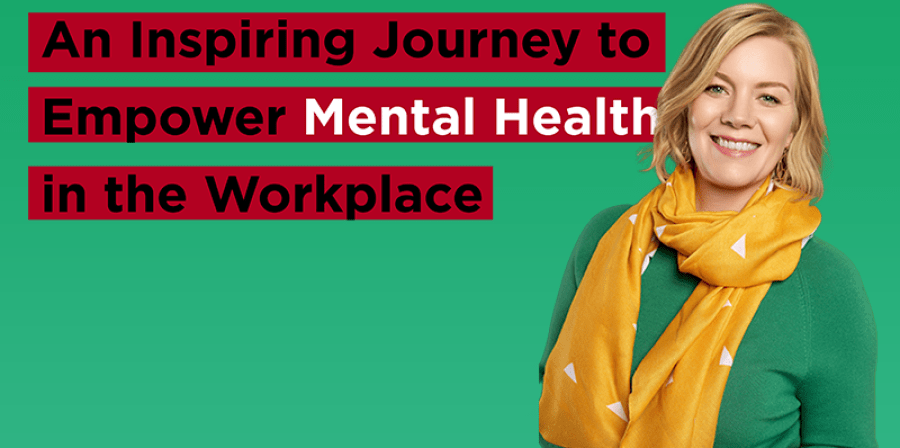Petra Velzeboer: From Trauma to Triumph
13th February 2023

An Inspiring Journey to Empower Mental Health in the Workplace
We recently had the pleasure of welcoming Petra Velzeboer to the Kruger Cowne Headquarters in Chelsea, London. Petra is a psychotherapist and executive coach and holds an MSc in Psychodynamics of Human Development. In this deep dive, Petra tells us about her own story, growing up in a notorious religious cult. She then gives her expert insights on how to empower mental health in the workplace and what responsibilities we all have in ensuring it continues to thrive.
I often ask leaders to raise their hands if they invest in themselves in some way. 95% of the room will usually raise their hands – I’ll then ask them to keep their hands up if their team knows what they do – most of the room will put their hands down.
Growing up in a cult
Having grown up in a cult, where groupthink and brainwashing were the norms, the topic of mental health is one that hits close to home for Petra.
“Born and raised in the notorious Children of God cult, groupthink and brainwashing were simply a way of life. To do anything just for yourself without thinking of the collective was seen as selfish or worse, influenced by the Devil.
I grew up in lots of countries, experienced the good side of commune life too and didn’t go to school as a child as we believed the world was going to end. Interestingly the full extent of my trauma didn’t show up until after I’d left.
At 22 I moved to London pregnant and while I lived with my boyfriend and his normal family, I descended into depression, and addiction and wanted my life to end.
Through my own rock bottom moments, I ended up learning that we can teach ourselves to be happy and slowly, I began to change my life. Over time I studied psychotherapy and got an MSc at Birkbeck, developing into my role as CEO of PVL – a mental health consultancy that supports culture change.
When life gets hard as it often does, firstly I am now grateful that I deal with ‘normal life challenges’ and secondly I ask myself what is in my control and take a proactive approach to invest in my own well-being and mental health.”
Incorporating Mental Health into the Workplace
Petra believes that to have a workplace that is both accommodating and open for discourse around mental health, there must be accountability, both from an individual and organisational perspective:
The way I support organisations is firstly challenging how they view mental health in the first place. Mental Health is about all of us, it’s about performance, retaining talent, culture, and the bottom line of the business – it is not just about signs and symptoms and what to do when someone is struggling.
A well-being strategy is essential but it’s no good if it isn’t brought to life at all levels of the business – from your exec team right down to your most junior member of staff. Awareness days are great to get you started but what next – how do you embed these ideas into your ways of working and behaviours? That’s what we help with.
Personal Responsibility for Mental Health
Petra encourages employees to take personal responsibility for their mental health by fostering self-awareness and understanding what their bodies and minds are telling them. She challenges individuals to think for themselves, experiment with different approaches, and invest in the things that help them personally thrive.
When discussing the well-being approach most companies take (which I’m sure many readers will be familiar with), Petra remarked:
“Awareness days are great to get you started but what next – how do you embed these ideas into your ways of working and behaviours? That’s what we help with.
It’s important for leaders to recognise the connection between their own mental health and the well-being of their employees. A leader’s actions and attitudes can set the tone for the entire organisation, so it’s crucial that they prioritise their own self-care and model healthy behaviours for their team.
I often ask leaders to raise their hands if they invest in themselves in some way. 95% of the room will usually raise their hands – I’ll then ask them to keep their hands up if their team knows what they do – most of the room will put their hands down.”
The benefits of Humour in the workplace for Mental Health
At the same time, incorporating humour and positivity into discussions about mental health can help to break down barriers and create a safe and open environment where employees feel comfortable discussing their own struggles and seeking support.
As a reader, it’s important to reflect on your own mental health and how it may be affecting those around you, both in your personal and professional life. Have you been taking the time to prioritise your own self-care? Are there ways in which you can encourage others to do the same?
It’s also worth considering the role that humour and positivity can play in mental health discussions.
“I think it’s important we laugh at ourselves, bring humour into conferences, and utilise stories to enable people to remember practical lessons and ideas to help change their culture for the better. After all, we remember what people make us feel more than what they say!”
Can you find ways to bring a light-hearted approach to serious topics, and create a culture of support and understanding in your own workplace or community?
By being mindful of these considerations and taking steps to prioritise mental health, we can create a world where people are able to thrive, both personally and professionally.





